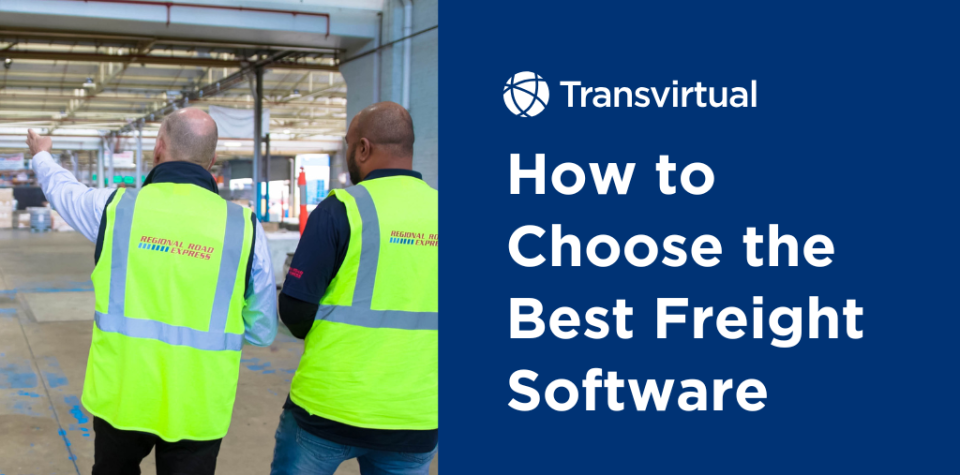Table of Contents
If your business moves products at all, you know your shipping operation is a core part of your business. For retailers fulfilling online orders, manufacturers supplying distributors, wholesalers moving bulk shipments – handling freight appropriately significantly affects your bottom line.
Freight forwarders, crucial players within logistics, rely on modern tools to optimize shipment tracking and route planning. This means you should never allow your business to rely on outdated tools and manual processes. You’ll invariably run into delays, high costs, and customer frustration. Instead, you should look into a modern Freight Management System (FMS), a software designed specifically to optimise every aspect of your shipping operation.
But as soon as you start looking, you’ll find a range of options out there. How do you pick the best freight management software for your business?
What is a Freight Management System?
Freight management systems are each built differently, but they share multiple key characteristics. They’re designed to centralise, automate, and streamline freight shipping processes. Rather than you having to juggle spreadsheets, emails, and carrier integrations, an FMS puts everything in one place. An FMS helps streamline freight processes for better visibility and decision-making, enhancing efficiency and reducing errors across various facets of freight operations.
A well-designed FMS can help your business:
- Move freight faster by automating dispatching, optimising routes, and reducing bottlenecks.
- Cut shipping costs by helping you compare carrier rates, avoid unnecessary fees, and consolidate shipments.
- Track their shipments in real-time with live ETAs and updates. No more wondering where your freight is at any given moment.
- Streamline invoices and payments to keep you from chasing down scraps of paperwork or matching bills to shipments manually.
- ·Improve customer satisfaction through proactive tracking and faster deliveries, which leads to fewer support calls and happier clients.
Who Benefits from FMS?
Any company in the logistics industry that ships freight regularly can benefit from an FMS. This includes ecommerce businesses, retailers, manufacturers, wholesalers, 3PLs, and more. If you’re in one of these industries, they’re an absolute necessity.
Understanding Your Freight Management Needs
Choosing the right freight management software starts with a deep understanding of your specific needs. This involves a thorough assessment of your business size and scope, identifying the unique challenges you face, understanding your workflow, and considering your growth trajectory. By taking these factors into account, you can select a software solution that not only meets your current requirements but also supports your future growth.
Assessing Your Business Size and Scope
The size and scope of your business play a crucial role in determining the type of freight management software you need. Start by evaluating the number of shipments you handle, the volume of cargo, and the geographic reach of your operations. This assessment will help you understand the level of complexity and scalability required in your freight management system.
For small to medium-sized businesses, a basic freight management software with essential features like shipment tracking, inventory management, and reporting might be sufficient. These features can help streamline your logistics operations without overwhelming your team. On the other hand, larger businesses with more complex logistics needs may require an advanced freight management system. Such systems often include features like transportation management, warehousing, and comprehensive supply chain visibility, which are essential for managing large volumes and intricate logistics networks.
Identifying Your Challenges
Every business faces unique challenges in its logistics operations, and identifying these pain points is critical in selecting the right freight management software. Consider the specific issues you encounter, such as inefficient tracking systems, inventory management problems, or difficulties in route optimization. Make a list of these challenges and prioritize them based on their impact on your business.
For instance, if inefficient tracking systems are a major concern, look for a freight management software that offers real-time tracking and monitoring capabilities. This feature can provide you with live updates on your shipments, reducing uncertainty and improving customer satisfaction. If inventory management is a significant challenge, seek out software with advanced inventory management features, such as automated tracking and detailed reporting. These capabilities can help you maintain accurate inventory levels and streamline your supply chain management.
Understanding Your Workflow
To ensure seamless integration, it’s essential to understand your existing workflow before selecting a freight management software. Analyze how information flows through your organization, from order processing to shipment tracking and delivery. Identify any bottlenecks or inefficiencies in your current processes and look for a software solution that can address these issues.
For example, if your current process for tracking shipments is manual and time-consuming, consider a software that automates this task and provides real-time updates. Automation can significantly reduce the time and effort required to manage shipments, allowing your team to focus on more strategic tasks. Additionally, if multiple departments are involved in your logistics operations, look for a software that facilitates communication and collaboration. This can help ensure that everyone is on the same page and working towards common goals.
Considering Your Growth Trajectory
As your business grows, your logistics needs will evolve, and it’s crucial to select a freight management software that can scale with you. Consider your plans for expansion, whether it’s entering new markets, increasing shipment volumes, or diversifying your product offerings. Look for a software solution that can adapt to these changes and provide the necessary features to support your growth.
For instance, if you plan to expand into new markets, choose a software that can handle multiple currencies, languages, and regulatory requirements. This will help you navigate the complexities of international logistics and ensure compliance with local regulations. If you anticipate a significant increase in shipment volumes, opt for a software that can manage high volumes of data and provide advanced analytics and reporting capabilities. These features can help you make data-driven decisions and optimize your logistics operations for maximum efficiency.
By thoroughly understanding your freight management needs, you can select a software solution that addresses your specific challenges, integrates seamlessly with your existing processes, and supports your growth. This will ultimately help you improve operational efficiency, reduce costs, and enhance customer satisfaction.
Factors to Look for in an FMS
Some FMS are built for gigantic enterprises with global logistics goals – others cater to small-to-medium sized businesses that want to simplify their shipment management. You’ll need to find one that balances functionality, ease of use, and long-term value without adding to your headache each financial quarter. Choosing the right freight forwarding software can streamline operations and enhance customer experience.
Seamless Carrier Integration without a Marketplace
Many FMS platforms double as freight marketplaces. Carriers bid for jobs and end up racing straight to the bottom. Cheaper rates are great, but it often leads to:
- Unreliable service and inconsistent availability.
- Increased rarity of carrier loyalty. The company that handled your freight last week can move on to higher-paying customers.
- Hidden fees, markups, and other factors that drive up shipping costs.
With Transvirtual’s FMS, you can connect directly with preferred carriers with no bidding wars or artificial price fluctuations. Our platform ensures predictable costs and trusted service, which is what matters most in any shipping operation.
Time-Saving Automation & Ease of Use
Your shipping logistics likely have a ton of moving parts as is. You definitely don’t need software that adds to your carefully-controlled chaos. The best FMS will automate rote tasks to help your team focus on high-level operations while being easy to navigate and utilise.
Effective logistics management can improve supply chain operations by optimizing transport routes and enhancing efficiency within freight management software.
Some automation features to look out for include:
- Smart carrier selection that assigns shipments to the most cost-effective carriers based on your preferences.
- Auto-dispatching that eliminates manual order entry by pushing shipments straight to carriers.
- Instant invoicing to help you integrate billing processes seamlessly with your accounting system to end paperwork chasing.
- A clean and user-friendly interface that won’t takes weeks of training to understand.
Real-Time Shipment Tracking
Shipments have a strange tendency to “disappear” between pickup and delivery – especially if you rely on outdated tracking methods. A modern FMS enables:
- Live GPS tracking so you no longer stare at an “in transit” screen. See exactly where freight is in real-time.
- Automated customer notifications to keep your customers informed without the need for manually-sent updates.
- Predictive ETAs that help you know about delays before your customers do.
Make the Right FMS Choice for Your Business
When the time comes to enhance your shipping operation, choose the right foundation. You need a system that fits seamlessly into your existing workflow. You’ll want one that provides full control over your carrier choices. Your FMS should eliminate bottlenecks and inefficiencies while helping your business scale over time. Selecting the right software solutions can enhance efficiency and address challenges in logistics operations.
Fortunately, Transvirtual’s FMS can make all of this possible. We won’t force you into a rigid workflow that doesn’t adapt to your needs – nor will you have to rely on a freight marketplace that drives prices down at the expense of reliability. Our FMS was designed to benefit the entire shipping industry from the ground up.
If you’re ready to take control of your freight operations, reach out to a member of the Transvirtual team today. In your free strategy session, we’ll help you discover how our FMS can integrate beautifully within your existing systems and help your business thrive.


